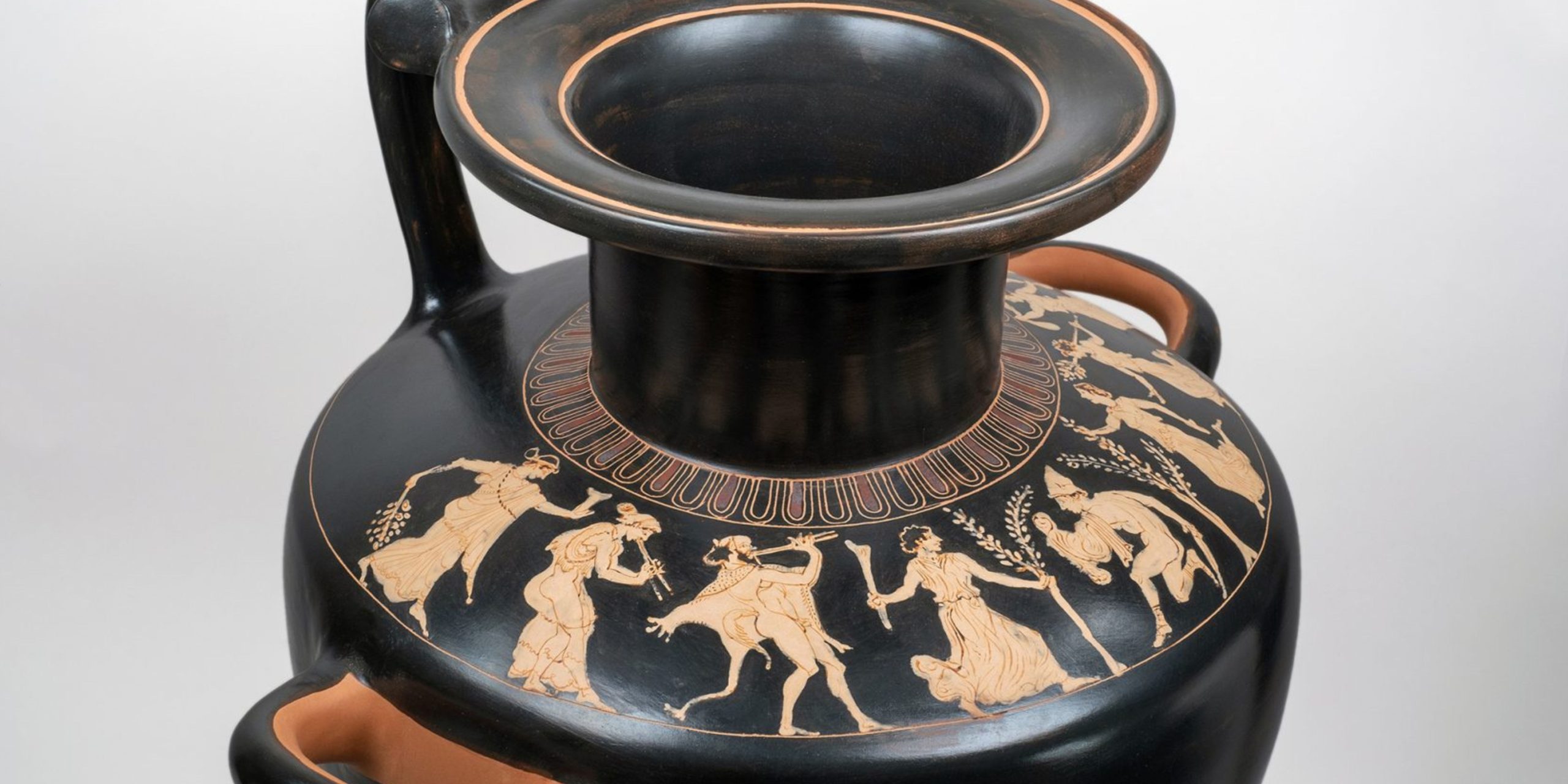
Ancient Greek music shows us a deep history of culture and art.
Key Highlights
- Music was a big part of life in ancient Greek society. It was in religious events, festivals, daily activities, and even in schools.
- The ancient Greeks thought that music could greatly affect the soul. They believed their gods invented the musical instruments.
- A wide range of instruments, like the lyre, aulos, and syrinx, made a lively sound in ancient Greece.
- Even though much of ancient Greek music is lost, we can still see parts of it in art. These pieces give us hints about how rich and complex their music was.
- What the ancient Greeks understood about music, its scales, and their ideas still influence Western music today.
Ancient Greek music shows us a deep history of culture and art. This music tradition is strongly connected to Greek life and has continued for many centuries. It has also greatly shaped Western music. The instruments played and the poems sung reflect the heart of ancient Greek culture. During the classical period, Greek musicians made melodies that have continued to resonate over time. They helped form the core ideas of music. By exploring this music, we learn about ancient sounds and see how music related to society back then.
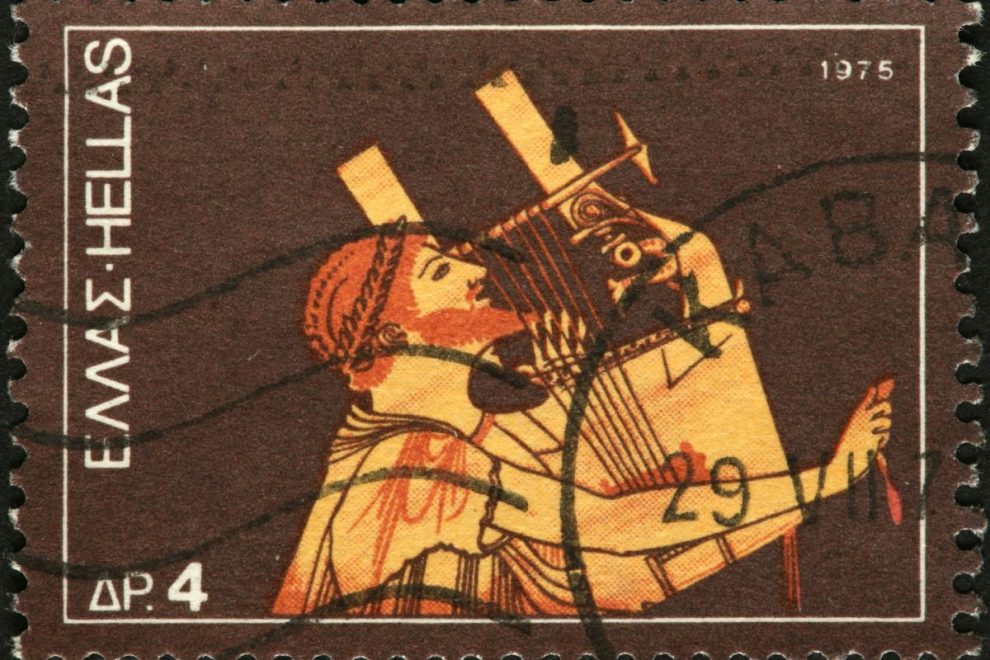
The Etymology of the word “Music”
Regarding the etymology of the word music: the word, according to the writings of ancient Greek poets and philosophers, is derived from the word muse. The word Musa, again, is derived from maousa = Musa. “Ma” is the root of the verb mao-mo which means to invent or search or ask intellectually. In the Doric dialect, the word “Musa” is “Muse”.
An important point in world music history is the flourishing period of ancient Greek music. When geometry and mathematics contributed to the study of music but also the construction of the first musical instruments, organic music began to develop in ancient Greece until the 6th century we have mainly vocal music as a means of expression. This shift to organic music is confirmed by the work “Pythian Law”, which is the most important pipeline law of the music of ancient Greece and described the struggle of Apollo with the dragon Python. It was an invention of Sakadas and is perhaps the first example of purely programmatic (descriptive) music.
The Origins and Evolution of Ancient Greek Music
The development of music in ancient Greece was not alone. Instruments like the lyre and aulos, along with music styles, likely came to Greece due to interactions with nearby cultures. As time went on, the Greeks took these musical ideas and made them different. They thought their instruments were from the gods and gave music a deeper meaning. They believed that certain kinds of music could bring out specific feelings and traits in people. This belief became important in how they saw the power of music in their lives.
Tracing the Roots: From Minoan to Hellenistic Times
The history of ancient Greek music starts in the Bronze Age. This was when early civilizations lived in the Aegean area. The Minoans and Mycenaeans were cultures that existed before the classical period. They had harps, lyres, and instruments that make sounds by striking. During the Archaic and Classical periods, city-states helped music grow in fresh and exciting ways. Greek music theory developed with help from important figures like Pythagoras. This development went alongside new instruments, performances, and ways to write music. Thinkers like Plato and Aristotle also made music an important part of education and community. In the Hellenistic period, after Alexander the Great won many battles, Greek culture spread widely. This included their music. They made more detailed instruments, such as the hydraulis, which is a kind of organ. During this time, there were many musical performances in big cities.
Influences on Western Music and Beyond
The impact of ancient Greek music on Western music is very important. Greek music theory greatly influenced ideas about scales, modes, and harmonics. These concepts helped make music in the Western world. The modes made by the ancient Greeks, like Dorian, Phrygian, and Lydian, were important in early church music. They became key parts of Western music tradition. The works of Greek thinkers and music experts have been looked at and changed over time. They had a strong effect on music. The thought that music can express feelings is important. This idea comes from the Greek concept of ‘ethos.’ It still shapes how we make, play, and appreciate music today.
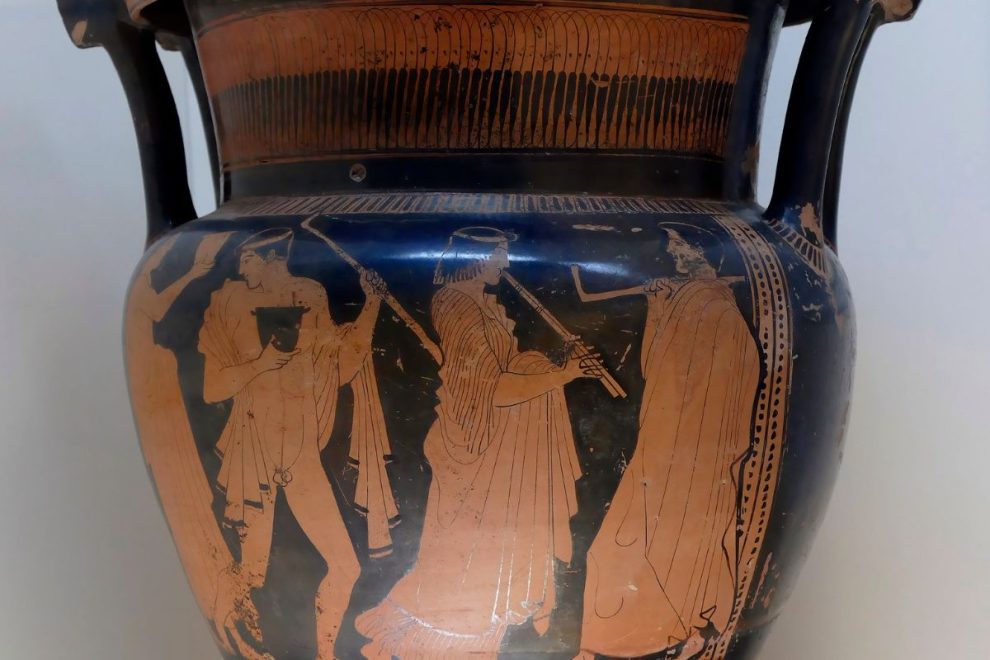
The Role of Music in Ancient Greek Society
Music in ancient Greece was not just for fun. It was a key part of their society. People used music in many ways, like during religious ceremonies and for education. It had a big impact on both personal lives and the community. The Greeks thought music affected the human spirit deeply. They believed it could change a person’s character, promote good values, and help balance the mind and body.
Music in Daily Life
Music was a big part of life in ancient Greece. It was not only in fancy places but also in everyday settings. You could hear music at large religious festivals and even at small social gatherings. In homes, the sound of lyres was everywhere. Women sang while they worked. Children sang old songs in the streets to make some money. The symposium was an important part of Greek life. It became a lively music gathering. Men played the lyre and aulos. They joined their voices to share songs, stories, and good times. In public events, religious ceremonies, and during free time, music showed the lively side of Greek culture. It revealed their values and beliefs.
What Part did Music Have in the Schools of Ancient Greece?
Music was more than an art in ancient Greece. It was a big part of education. It was as important as reading, writing, and physical training. Greek thinkers thought music could influence a person’s character. It helped teach self-control, balance, and good qualities in young people. Boys from wealthy families took music lessons. They often learned to play instruments like the lyre and kithara. This practice was not just about playing well. It also helped them grasp harmony, rhythm, and how to express their feelings. The goal was to create skilled musicians and responsible citizens. These citizens would enjoy beauty and order. They would also be ready to contribute something valuable to their community.
Sacred Music: Connecting the Divine and the Mortal
The ancient Greeks used music in their religious events. It helped them feel close to their gods. Sacred music played a big role in rituals, processions, and festivals that celebrated their deities. They sang serious songs for Apollo, and happy tunes for Dionysus. Music added depth to their worship. Group singing, often with tools like the aulos, connected people. Their voices came together in harmony to respect and please their gods. Through music, the Greeks showed thanks and wanted the approval of their gods. Music created feelings of wonder and connection. This shows how important it was in their religious customs.
The Integration of Music in Greek Theater
Music in ancient Greek theater was more than just background sound. It was an important part of the experience. In tragedies, comedies, or plays with satyrs, music deepened emotions, added meaning, and made the story feel richer. The chorus played a big role in Greek theater. They sang and danced to the music. They also interacted with the actors. The chorus’s rhythm and emotional singing made the words feel stronger. In Greek theater, music could tell stories and create emotions. It made the drama feel deeper. This helped produce strong reactions in tragedies and laughter in comedies.
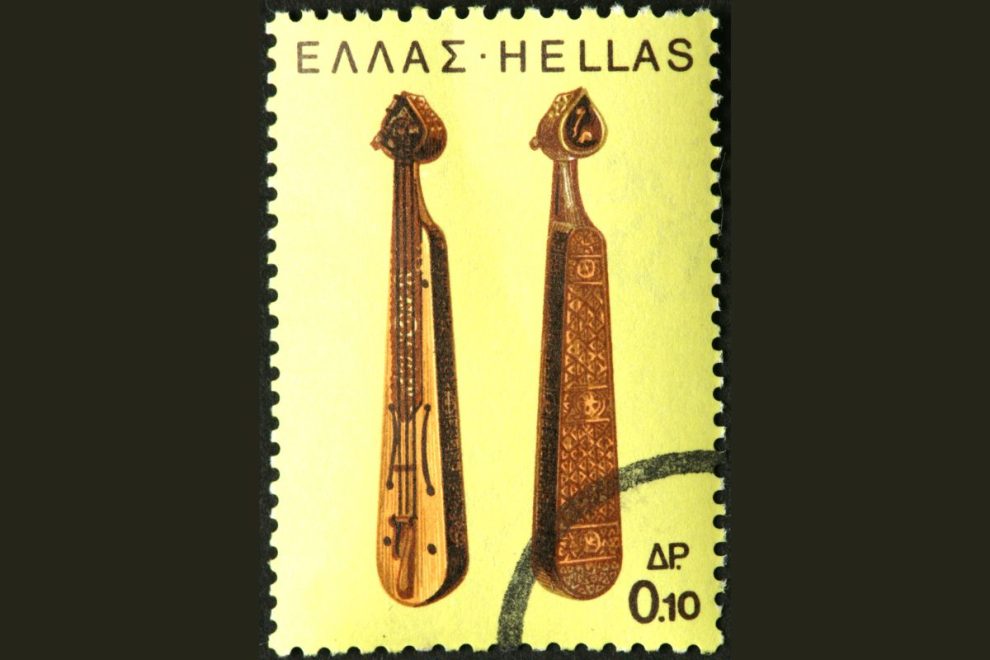
Instruments of the Ancients: A Sonic Palette
The ancient Greeks made many kinds of musical instruments. When they played together, they created a lovely sound. Each instrument had unique features and was used in various settings. These included small get-togethers and big religious ceremonies. The instruments belong to three main groups: strings, winds, and drums. Each group serves a unique purpose. Sometimes, they come together to create richer sounds and musical moments.
Stringed Marvels: Lyre and Kithara
In ancient Greece, the lyre and kithara were important string instruments. The lyre was small and easy to carry. It was often connected to Apollo. Its sound box was made from a tortoise shell. When you plucked its seven strings, it made soft and beautiful sounds. The kithara was larger and had more strings. It was louder and suited for big gatherings and professional musicians. Art often displays the kithara. This shows how the Greeks valued quality and beauty in music. The lyre and kithara were not just tools for making music. Their sounds went well with poems. They helped create the right feel for grand stories. They also showed how important education and culture were in Greek society.
Winds of the Past: Aulos and Syrinx
The lyre is a musical instrument often connected to ancient Greece. However, the aulos and syrinx were also important in their music. The aulos is a wind instrument. It usually comes as a pair of double-reed pipes, similar to an oboe. Its sound is strong and can feel both happy and sad. People often link it to the god Dionysus. On the other hand, the syrinx, which is also called panpipes, creates a more natural sound. It is made from reeds that are different lengths and tied together. The syrinx makes soft, light sounds. It is connected to the god Pan, so it feels close to nature. Even though the aulos and syrinx have different designs and sounds, they both brought richer tones to Greek music.
Rhythm Keepers: Percussion Instruments
Ancient Greek music was not just about lovely tunes. It had a strong beat from percussion instruments, which made the sounds richer. These instruments were made in various shapes and sizes. They were very important for religious events and public celebrations. The tympanon is a type of drum that makes a loud sound when played. It provided a beat for religious events and dances. Krotala are clappers made from wood or bone. They added a sharp rhythm to music groups. Cymbals, made from bronze, created bright ringing noises or loud crashes. Even if percussion was not the main focus like string or wind instruments, it was still very important. It helped shape the sound of ancient Greek music. It added energy to their lively musical traditions.
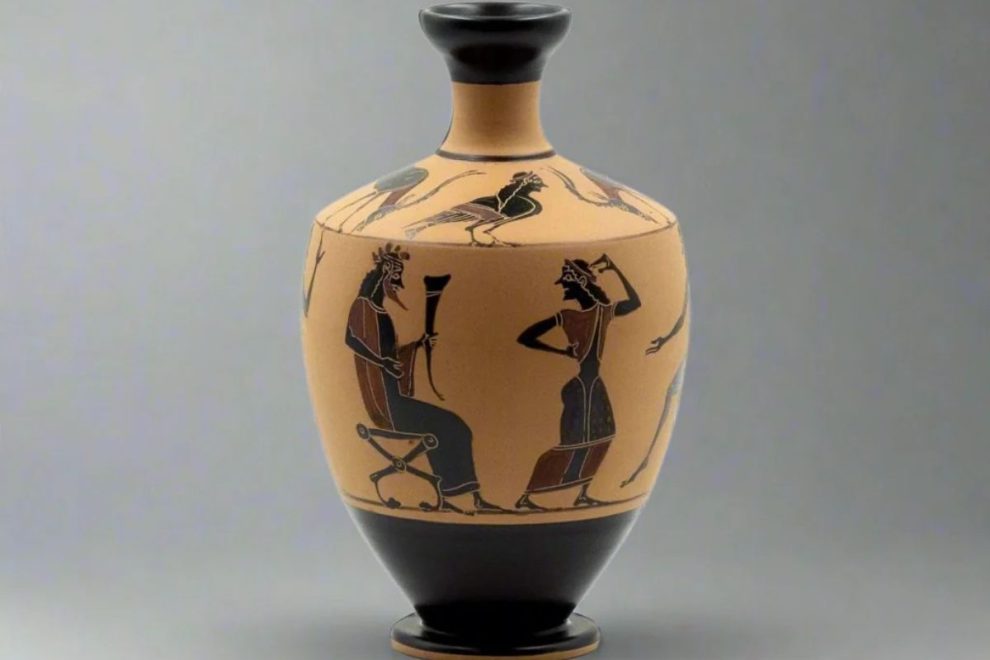
The Foundation of Harmonics
Harmonics in Ancient Greek music were the base of their musical system. This base came from the Greater Perfect System, a complex scale system that shaped Greek music ideas. The blend of different modes and scales formed a special musical style that was important in ancient Greek culture. Understanding harmonics was key for professional musicians, and it was also linked to religious events and performances in ancient Greek life. The Greeks believed in the “music of the spheres.” They thought that celestial bodies made sounds that matched their music ideas. Today, the study of harmonics in Ancient Greek music still interests scholars and musicians. It gives us a look into the musical importance of that time.
The System of Modes: Tuning and Scale
In ancient Greek music, modes were very important for tuning and scales. The Greeks thought music could create certain feelings and could even shape a person’s character. The modes, called ‘harmoniai,’ were key parts of their music theory. They helped define the notes and spaces used in songs. Each mode had special qualities and moods that showed how well the ancient Greeks understood music. These modes helped shape melodies and harmonies, guiding musicians in making music that matched their intended feelings and spiritual goals. The mode system in Greek music provided a basis for musical scales and tunings that still impact music theory and song-making today.
Rhythmic Patterns and Composition Techniques
Ancient Greek music showed a rich mix of rhythms and ways to compose. The busy beats in the songs back then were not only pleasing to hear but also reflected the deep culture of Ancient Greece. Musicians carefully combined different musical parts to create smooth pieces that connected with listeners. From the complexity of the beats to new ways of making music, ancient Greek music showed the talent and skill of musicians at that time. These rhythms and ways of composing have greatly affected music over the years, shaping many styles and genres that came after.
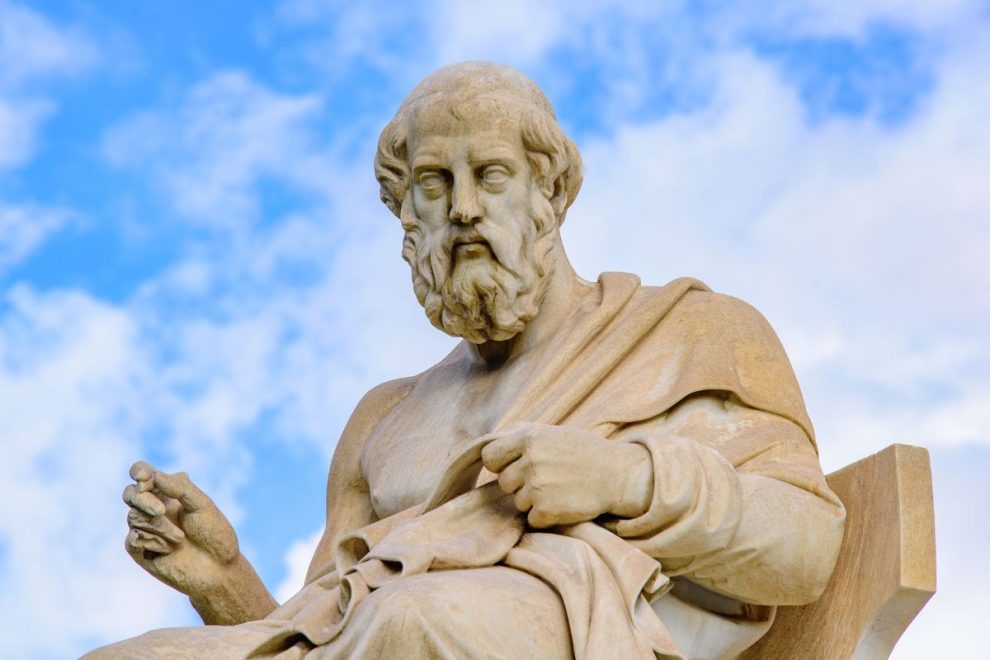
Iconic Composers and Musicians of Ancient Greece
Much of the music from ancient Greece is now gone. However, we still know the names of some composers and performers. We learn about them from old pieces, writings, and stories by poets and historians. These people were important in shaping music in ancient Greece. They created new ideas, performed, and inspired those who followed them. For example, Orpheus is a well-known figure. People say his musical talent could charm the gods. Then there is Terpander, who is known for making the lyre better and music contests more popular. These people show what great music was like in ancient Greece.
Terpander and Olympus: Pioneers of Melody
Terpander and Olympus are key names in the history of ancient Greek music. They were important in how people made and performed music long ago. Terpander was a poet and musician from the 7th century BCE. He is known for improving the lyre by adding strings. This change helped it make more sounds. He also was skilled at making music with new rhythms and tunes. Olympus, who blends history and mythology, helped make the aulos better. He took this instrument to new levels. He is also known for creating sad and moving music that reached many people.
Philosophers and Music: Plato, Aristotle, and Pythagoras
Ancient Greek philosophers knew how music impacts the human spirit. They thought music was more than art. It played a big role in a good society and was a strong way to shape character. Pythagoras looked at harmonics and discovered that music follows math rules. He believed music showed the harmony of the universe and affected everything around us. In his book, Republic, Plato linked music to morals and ethics. He suggested specific musical styles because he thought they helped people be more good and fair. Aristotle saw that music is fun and helps people feel their emotions. He also said that music can help form good habits and shape how a person acts. These thinkers pointed out the close connection between music and human life.
Preserved Works and Archaeological Discoveries
We learn about Ancient Greek music from small bits of evidence. This makes it interesting and exciting. Things like old artifacts and images in art help us understand this lost world of sound. They also inspire us to keep exploring this rich musical tradition. Even though these discoveries are often not complete and hard to fully understand, they still give us a nice look into the beauty and feel of this calm music. From marble carvings that show musicians to written music notes, the past shares its secrets with us in interesting ways.
An Insight into Ancient Melodies
Most ancient Greek songs are gone, but a few are still here. These pieces show us a rich music tradition. They were written on paper, stone, and even on pieces of pottery. This gives us a true connection to sounds from long ago. One important example is the song of Seikilos. This full song comes from the 1st or 2nd century CE and is found on a tombstone. Its lovely tune and deep lyrics speak about love, loss, and how life is short. These feelings still touch us today, thousands of years after. The remaining works, along with parts of songs found in old texts, still interest scholars and musicians. They show us the feelings and music styles that were popular in ancient Greece.
Musical Imagery in Art and Inscriptions
Artistic images and writings give us important details about music in ancient Greek culture. Pictures on vases and statues show musicians playing different instruments like the lyre and aulos. This shows how important music was in daily life and in religious ceremonies. Writings found on old items often have musical notes. They give us a look at the sounds and styles of that time. Musical images in art and writings show the strong link between music and the ancient Greek world. They highlight the cultural and spiritual role music played in their society.
Surviving Pieces of Ancient Greek Music
We have lost much ancient music, but some pieces are still here. This helps us feel the music that used to be in ancient Greece. The pieces we have are often not whole. They show us just a part of the rich music culture from back then. One of the most important works is the Delphic Hymns. They are four hymns found at Delphi that date back to the 2nd century BCE. These hymns are for the god Apollo. They show us what ancient Greek religious music was like and how they wrote it. Another key discovery is a score that goes with a chorus from Euripides’ play Orestes. Even though these pieces are not whole, they help us imagine the greatness of ancient Greek music. We can feel the beauty in its melodies and rhythms. These pieces are important for understanding how music grew and shaped Western and other world traditions.
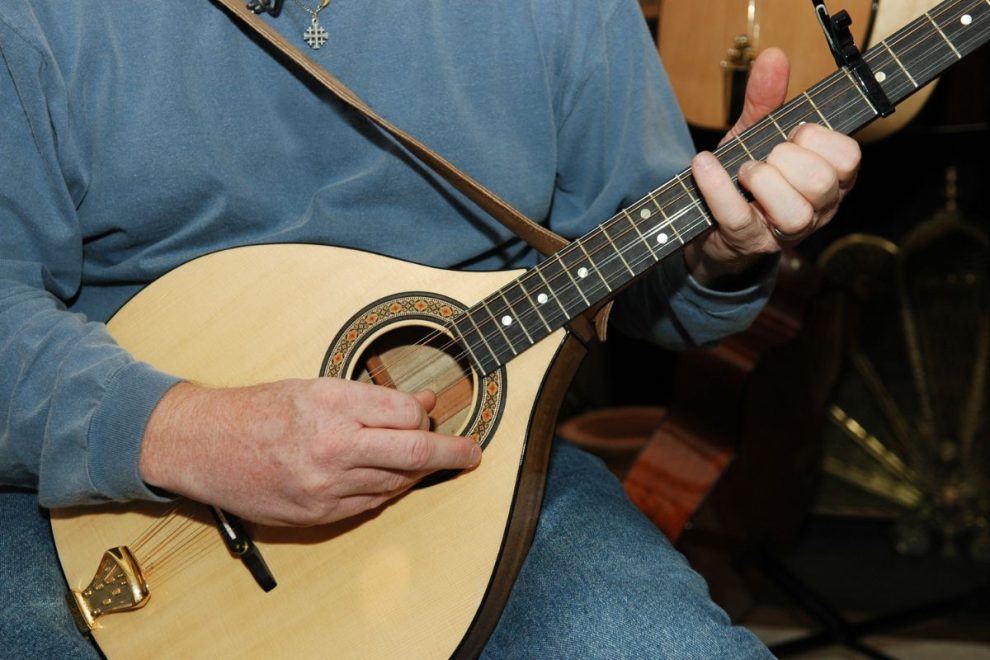
Ancient Greek Music and Modern Genres: A Look at Differences and Similarities
The music from ancient Greece is still present in today’s music styles, even after thousands of years. We can’t compare them directly. However, if we consider the ideas in the music, like melody, mood, and the emotions it conveys, we can notice some interesting connections. This is clear in modern classical music. Many composers find ideas in ancient Greek music. They mix Greek styles, moods, and sounds into their new pieces.
Legacy in Contemporary Classical Music
The influence of ancient Greek music is significant and still impacts Western music today. Many concepts in music, like scales and modes, come from Greek musicians and thinkers. We see this impact in today’s classical music. Composers take ideas from ancient Greek music for inspiration. They use different modes, read old Greek writings, and make old instruments in new styles. Composers use parts of ancient Greek music in their new songs. This links the past with the present. It shows that musical ideas can last long and keep inspiring people.
Folk Traditions and Their Ancient Roots
Many experts believe that some ancient Greek music can still be heard in modern Greek folk traditions, even if it is hard to prove. The music places a big emphasis on melody. It often uses unique scales, and music and dance are joined together, similar to what we know about ancient Greek music. Traditional instruments like the harp and various wind and drum instruments are still very important in folk music. These instruments help us stay connected to the past. It’s great to see that folk music grows and changes over time. It is passed down and adjusted each year. Sometimes it can be hard to see clear links to old songs or performances. However, the way modern and ancient music feel is very similar. The way we approach music today shows a strong and lasting connection to ancient Greek roots.
How did Ancient Greek Music affect the music we have today?
The effect of ancient Greek music is more than just a part of the past. It plays a big role in today’s music across many styles. A long time has gone by, but the core ideas of melody, harmony, and rhythm from the Greeks still show us their impact. The scales and modes that musicians use today are from the Greeks. They believed music was a powerful way to express feelings. This idea is still important in music theory and practice today. Even though we may not know what ancient Greek music sounded like, its main parts have lasted over the years. These parts have changed how we make and understand music. Modern musicians, no matter what type of music they play, get ideas about sound from ancient Greek times. They may not even know this is happening.
Ancient Greek music lets us explore our past. It shows us important details about society, culture, and art. The clear sounds from rituals and fun tunes from plays share a music tradition that still influences music today. Instruments like the lyre, aulos, and drums made life more enjoyable. They also helped teach important ideas. The music we have connects us to songs that moved people back then. It links us to a world where music brought together the gods and humans. Ancient Greek music has lasting importance. It shapes today’s classical and folk music with its special charm.
Take a musical journey through history and discover the magical world of Ancient Greek music.
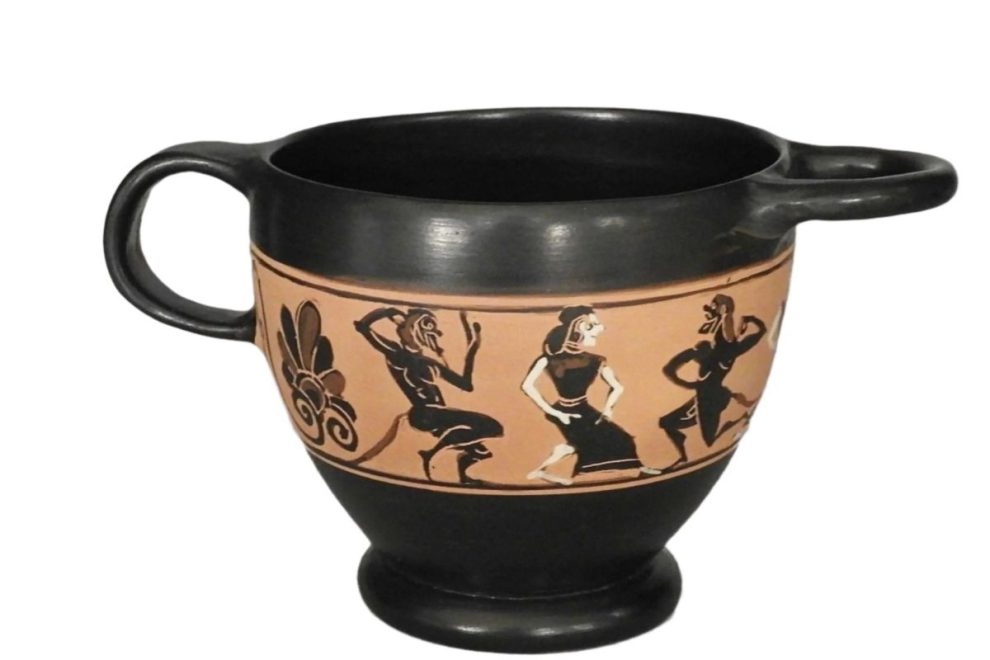
Custom-Made Ceramics by Attic Black Depicting Ancient Greek Musicians
Our bespoke and made-to-order items fall into the eclectic style décor category. But what does that mean? At its essence, the eclectic style rests on an energetic, eccentric, and funky concept and borrows elements from different styles and trends, yet it creates a coherent look using colors, textures, and patterns. The eclectic style embraces contrasts that harmonize and draws on a plethora of strategies to achieve a well-considered and well-thought-out décor.
✔️ Click here to browse at our exclusive collection
➡️ If you are interested in adding a custom-made ancient design to your collection, or if you are searching for a decorative piece that will aesthetically elevate your area, we have the experience and the know-how to assist.
Below you may find the ways to contact us:
📱 +30 2103232005
🗓️ Schedule an appointment to visit our workshop in Athens
